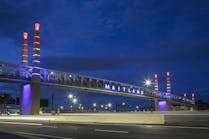The South Asia Lighting Transformation Forum is scheduled for January 17-19 in Malé, Maldives. The forum will seek to define a roadmap for lighting in South Asia with a commitment to efficiency and clean energy. LED-based solid-state-lighting (SSL) will be a key technology in meeting the goals that are being set by the Regional Centre for Lighting (RCL), established within the Sri Lanka Sustainable Energy Authority.
The list of players behind the forum and the RCL is long. SARI/Energy (South Asia Regional Initiative for Energy) is cosponsoring the forum and was a party to the creation of the RCL. The SARI/Energy program is run by the USAID (United States Agency for International Development) organization. Rensselaer Polytechnic Institute’s Lighting Research Center (LRC) serves as the primary knowledge partner of the RCL. All of the above organizations and agencies along with the State Electric Company of Malé are behind the forum.
According to Nadarajah Narendran, the forum will bring together key stake holders from government, funding agencies and banks, and LED and luminaire manufacturers. Narendran is the director of research at the LRC, and the principal investigator on the RCL project.
One of the goals of the RCL is the establishment of regional standards and practices for sustainable lighting according to Narendran. He points out that the South Asia region is quite different from other areas adopting SSL. For example, the residents in the region are far more concerned about the cost of electricity than are many people in other regions. The citizens are accustomed to much lower lighting levels. So region-specific standards and practices will be needed.
Narendran also notes that in South Asia the peak electrical demand is at night and is driven by lighting. There is far less industrial activity that would drive high levels of daytime energy use.
Clearly there is a financial angle as well. Narendran said, “A $2 lamp is still an important proposition in that part of the world.” Part of the mission of the RCL will be to drive down costs. One way that can happen is through local manufacturing. Narendran said, “Local manufacturing could make it more affordable.” Moreover there is the trickledown effect that economic development leads to jobs and in turn leads to more residents that can afford electricity and lighting.LED and luminaire makers will also benefit by participating in the forum. Narendran said, “Manufacturers will learn what is required for market entry.” While SSL has been proliferating in other regions of the world, it’s brand new technology for South Asia.
The forum will cover both grid-powered lighting and applications, and off-grid scenarios as well. According to Narendran, less than half the residents of the region have electricity in the home. Clearly the program will seek to boost that figure over time.
The RCL was formed in April 2009, primarily by USAID, the Sri Lanka Energy Authority, and the LRC. According to Narendran, the past months have been spent in staff development and setting up laboratory space. The RCL will have a fully functional lab running by December with the primary purpose of quality evaluation and control. Narendran said, “You don’t want low quality products to spoil the market.”
The organizations are still working out the details of the forum schedule. The tentative schedule includes opening ceremonies with honored government leaders on January 17 followed by a dinner. January 18 will include a day of presentations followed by interactive breakout sessions on Jan 19.
The stated mission of the RCL is “Advancing sustainable lighting and making it affordable in South Asia to improve the wellbeing of citizens and the countries within the region.” Countries covered by the program include: Afghanistan, Bangladesh, Bhutan, India, Maldives, Nepal, Pakistan and Sri Lanka.




